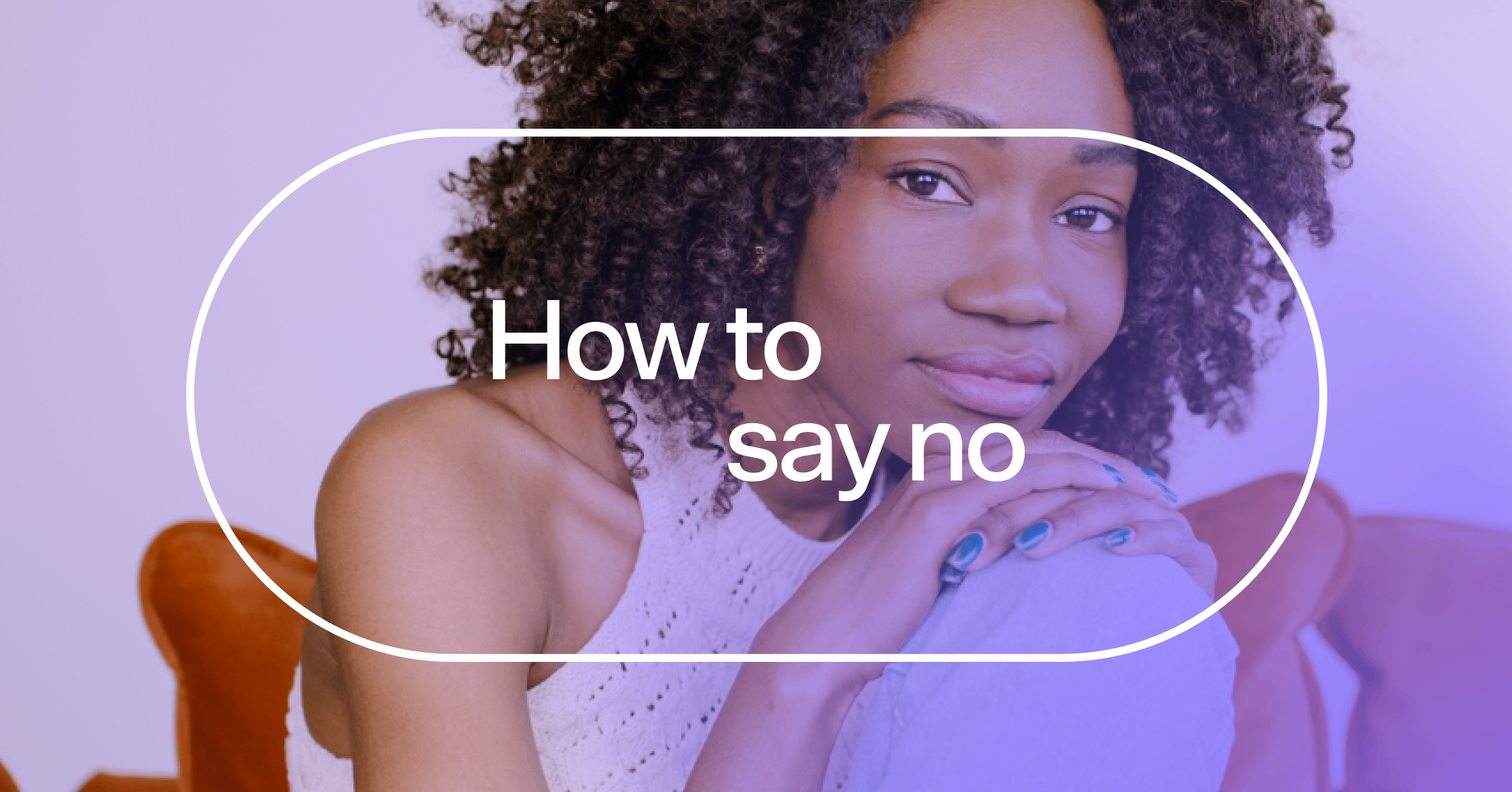Learning how to say no and prioritize your own needs is a powerful way to protect your well-being and support your mental health.
There are many reasons why you might feel guilty about saying no, including people-pleasing behaviors, recovering from trauma, or a conflict-avoidant person.
Therapy can help you learn to set healthy boundaries and say no without feeling guilty.
We’ve all been there: Saying yes to an event we’d rather skip. Taking on extra work when we’re already stretched thin. Agreeing to a commitment we’re not sure we can keep.
Saying no can sometimes feel hard because we don’t want to upset others or seem rude. But learning to say no is an important skill to nurture. It can be an act of self-care that protects our time, energy, and well-being.
If constantly saying yes is leaving you emotionally drained, therapy can help you set boundaries and manage or reduce the guilt that comes with it. A therapist can support you in building confidence and practicing assertive communication so you can feel comfortable about prioritizing your needs.
Why you might feel bad about saying no
Making self-care a priority can take time and practice, and, for many, saying no and setting boundaries feels uncomfortable. Learning to say no is an important part of personal growth, but it can be tough for several reasons, including:
Past trauma: If you’ve been through difficult experiences, like childhood hardships or abuse, you may have learned to be overly agreeable to feel safe. This instinct — known as fawning — kicks in when people say yes just to avoid conflict, even at the cost of their own needs.
Low self-worth: When someone has low self-esteem, they may believe their value is tied to being helpful or pleasing others. This can lead to saying yes when they really want to say no.
Social and cultural expectations: In some cultures or families, saying no is seen as rude, disrespectful, or unacceptable. This can make it even harder to set boundaries.
People pleasing: If you grew up in a home with emotionally immature parents, you may have learned early on to suppress your feelings to keep the peace with people-pleasing behaviors. These tendencies can carry into adulthood, making it challenging to stand up for your own needs.
Fear of conflict or disappointment: Guilt and obligation can weigh on us when we’re afraid of disappointing others or causing conflict. But research shows that saying no usually doesn’t lead to the problems we imagine.
The care you need, when you need it
Learn how Rula can support your mental health journey
How saying no can protect your well-being
Saying no is a powerful form of self-care with several mental health benefits. It can help you align your actions to your values and save your time and energy for what really matters to you.
Additional benefits include:
Protecting your boundaries: Boundaries prevent you from feeling drained, disrespected, or stretched too thin. This might look like not responding to work emails after 6 p.m., not looking at your phone first thing in the morning, or reserving a day of the week for self-care. Saying no isn’t selfish, it’s a way to honor your needs.
Preventing burnout: Feeling burned out — chronically stressed, exhausted, and disconnected from your work — could be a sign that you need to say no more at work. If you’re noticing signs of burnout, it’s important to take action right away to protect your well-being.
Improving your mood: Agreeing to things, when you actually want to say no, can leave you feeling exhausted or resentful. By saying no with confidence, you give yourself more time and energy for the activities or people that bring you joy.
Boosting productivity and focus: Saying yes to everything can pull you away from your priorities. By setting limits, you can stay focused on the areas of your life that are most important to you.
Enhancing relationships: Healthy relationships are built on mutual respect. When you set boundaries in your relationships, you communicate honesty and self respect. The right people will honor and appreciate that.
Building confidence: Sticking to your boundaries and saying no when you need to is a powerful reminder that your time, energy, and well-being matter.
Five ways to say no without feeling guilty
Saying no doesn’t have to feel awkward or harsh. The key is finding an approach that feels natural to you. Try starting small — saying no to low-pressure asks — and reminding yourself that setting boundaries is an act of self-care, not selfishness.
Take these steps to make saying no easier.
Pause before responding. Instead of immediately saying yes or no, take a moment to consider the request. You can say, “Let me think about it and get back to you.” This brief pause gives you time to decide without pressure.
Use clear boundaries. You can communicate your boundaries in a confident and clear manner. Trying saying something like, “I appreciate the offer but can’t commit right now.” Using “I” statements keeps the focus on your needs, without making excuses.
Skip the apologies. You don’t need to over-explain or apologize unnecessarily. A simple, “Thanks for thinking of me, but I can’t make it,” is polite but firm. Over-apologizing can make your no seem negotiable.
Stay firm against pushback. If someone tries to guilt you, confidently restate your boundary by saying, “I understand this is important to you, but my answer remains no.” You don’t owe anyone an explanation for prioritizing your well-being.
Use positive affirmations. Remind yourself that setting boundaries is healthy. You’re not responsible for how others react to you saying no.
Still struggling to feel comfortable when saying no? Working with a therapist can help you understand the importance of setting boundaries and addressing people-pleasing tendencies.
Many people feel guilty about saying no because they worry about disappointing others. Social conditioning often teaches that being agreeable and accommodating is valued, which can make setting boundaries feel uncomfortable. Learning to say no with kindness and confidence helps reinforce self-respect and healthier relationships.

Ashley Ayala, LMFT
Clinical reviewer
Find care with Rula
Saying no is hard for many people. But constantly saying yes to everything can leave you feeling stressed, drained, and even resentful. A therapist can guide you in shifting your mindset so that saying no feels like an act of self-care, not rejection. With the right support, you can build confidence, set healthy limits, and protect your well-being.
At Rula, we’re committed to delivering a comprehensive behavioral health experience that helps people feel seen and understood so they can get back to feeling their best.
Rula makes it easier to find a licensed therapist or psychiatric provider who accepts your insurance so you don’t have to choose between affordable care and excellent care. With a diverse network of more than 15,000 providers, 24/7 crisis support, and appointments available as soon as tomorrow, we’re here to help you make progress — wherever you are on your mental health journey.
Rula's editorial process
Rula's editorial team is on a mission to make science-backed mental health insights accessible and practical for every person seeking to better understand or improve mental wellness.
Members of Rula’s clinical leadership team and other expert providers contribute to all published content, offering guidance on themes and insights based on their firsthand experience in the field. Every piece of content is thoroughly reviewed by a clinician before publishing.




